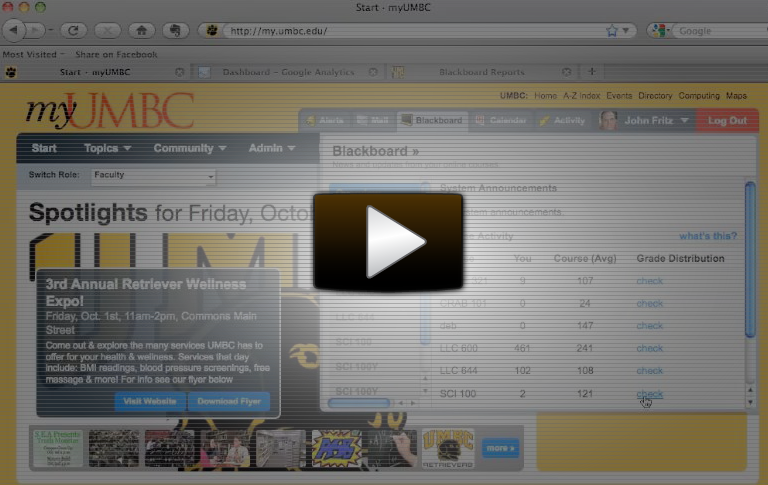Key Takeaways
- Can technology support student learning by raising self-awareness?
- To find out, the University of Maryland, Baltimore County built a "Check My Activity" (CMA) tool that lets students compare their use of resources in the university's Blackboard course management system to that of other students.
- Analysis of 1,461 courses using Blackboard in spring 2010 showed that D and F students used the course management system 47 percent less than students earning a C or higher.
- Maturing use of the CMA tool will show whether becoming aware of their successful peers' online course activity influences underperforming students to modify their own study behaviors or seek academic support.
The University of Maryland, Baltimore County (UMBC) uses a Blackboard course management system to support faculty and students. To supplement the CMS, the university created a custom "Check My Activity" (CMA) self-service feedback tool for students.1 In addition to comparing their online course activity against a class average, students can check their activity and frequency of use against an anonymous summary of peers who earned the same, higher, or lower grade for any assignment (if instructors use the online gradebook). Although students did not adopt the tool quickly when it was announced in spring 2008, UMBC is seeing increased use and some encouraging initial results. Continued use of the CMA tool will provide more evidence testing the hypothesis that peer comparisons can perhaps influence student meta-cognition, or what is sometimes described as "thinking about thinking."
The following five-minute video demo shows how the tool works, with some updates that followed acceptance for publication of a research article on the project in The Internet and Higher Education.2

Video courtesy of Elsevier and The Internet and Higher Education
- For more information on UMBC's Blackboard reports, see http://www.umbc.edu/blackboard/reports.
- The CMA is part of UMBC's academic analytics efforts, featured in The Internet and Higher Education's special issue on "Web Mining in Education." My article in that issue, "Classroom Walls That Talk: Using Online Course Activity of Successful Students to Raise Self-Awareness of Underperforming Peers," explains the project, how the initial version of the CMA tool works, and early results.
© 2010 John Fritz. The video demo is provided with the permission of Elsevier and The Internet and Higher Education. The text of this EQ article is licensed under the Creative Commons Attribution-No Derivative Works 3.0 license.
